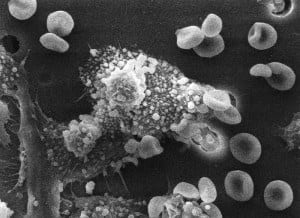Out of the Ordinary
A new place for breast cancer cells to live and a diabetes drug that can prevent them
Elif Geris

With the help of bone development cells, new tumors emerge
A new study shows that breast cancer cells can leak into bone marrow, women do not receive enough emotional support for the return of breast cancer and a diabetes drug can decrease risk of breast cancer in postmenopausal women.
According to EurekAlert! NOG, a gene necessary for bone development, is found to be associated with bone metastasis in prostate cancer. Now bone metastasis affects those with breast cancer, osteoclasts eating away at the bone, and causing a tumor, with the help of NOG cells. A tumor fills the space created by the NOG cells, and the NOG cells can create a higher risk for breast cancer with the aggressive cells transmitted.
According to The Guardian, out of 1,000 women who were observed at the St James’s institute of oncology in Leeds, 22.6 percent faced a relapse of breast cancer within 10 years of their first diagnosis. The study was done between Jan. 1999 and March 2002.
The study showed that before its return, women who survived breast cancer did not have the disease for 39.9 months and were free of it for about 17.9 months after its eventual return. fifty-one percent of the 1,000 women examined survived for at least three years after their initial recovery from breast cancer, and only five percent survived for 10.
The breast cancer study was funded by Macmillan Cancer Support, whose chief medical officer, Jane Maher observed that women do not receive the same attention they did upon a breast cancer relapse.
Maher said, “Far too many are given little practical or emotional support, the assumption being that they know what to expect from the first time they were treated.” Maher said that people who were diagnosed a second time are given less amount of support than those without such problems are.
In the meantime, a new study shows that the risk for breast cancer is 25 percent lower in women whom take the diabetes drug, metformin. Metformin prevents the cell, “mTOR,” changing “critical pathways involved in cancer,” said Rowan Chlebowski, a medical oncologist with the Los Angeles Biomedical Research Institute at Harbor-UCLA Medical Center.
Pro.f Peter Johnson, of Cancer Research UK, said, “In fact, for many women, the chance of cancer coming back is much lower than one in five,” adding that recurrence can be related to having passed menopause.
No cause-and-effect relationship was observed between use of the diabetes drug and breast cancer reduction. The U.S. Food and Drug Administration (FDA) has also issued warnings about metformin use.

















